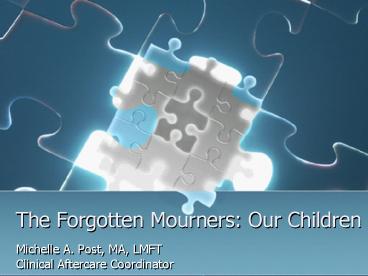The Forgotten Mourners: Our Children - PowerPoint PPT Presentation
1 / 19
Title:
The Forgotten Mourners: Our Children
Description:
1 in 5 kids will experience the death of someone close by age 18 (Kenneth Doka, ... Task 3: To Adjust to an Environment in Which the Deceased is Missing ... – PowerPoint PPT presentation
Number of Views:52
Avg rating:3.0/5.0
Title: The Forgotten Mourners: Our Children
1
The Forgotten Mourners Our Children
- Michelle A. Post, MA, LMFT
- Clinical Aftercare Coordinator
2
Question to Run on
- In the moment of the crisis, how can we assess
and assure that support is provided for children
and teens?
3
Watch Your Language!
Its okay to say dead died death
4
Childrens Grief Statistics
- 1 in 5 kids will experience the death of someone
close by age 18 (Kenneth Doka, Editor of OMEGA
Journal of death and dying)
5
Childrens Grief Statistics
- 1 in 20 kids will experience the death of one or
both parents by age 15 (Steen, 1998) - Close to 2 million children receive death
benefits from a deceased worker (Social Security
Administration, 2007)
6
What Does Grief Do to Kids?
- Some may experience developmental delays along
with long-term psychological, social, and
psychiatric challenges (Felner et. al, 1975
Kransler et. al, 1990 Worden Silverman, 1996)
7
What Does Grief Do to Kids?
- 37 of prepubertal children suffer from major
depression one year after the death of a parent
(Weller, Weller, Fristad, Bowes, 1991)
8
What Does Grief Do to Kids?
- Children of parents who die suddenly (suicide,
homicide, accident or natural causes) are 3 x
more likely to develop depression and are at
higher risk for post-traumatic stress disorder
(PTSD) than non-bereaved children (Brent
Melhem, 2007 University of Pittsburgh School of
Medicine)
9
Possible Pitfalls for Kids Who Do Not Reconcile
Their Grief
- Avoid love as a way to avoid pain
- Inability to acknowledge the pain of others
- Avoid risks
10
Possible Pitfalls for Adults Who Do Not Reconcile
Their Childhood Grief
- Inability to express love for their own children
- Experience a sense of searching for that which
was lost - Resisting school or work projects which demand
long-term commitment
11
OneLegacys Philosophy Responsible Rebels for
bereaved children
- We do not function as agents of conformity to
get the child over grief, but instead foster
growth in the child. - Too often we assume that the friends and family
members will support them in their grief journey.
- Parents/siblings can be too overwhelmed.
- Friends project feelings of helplessness by
ignoring the subject entirely. - From Alan Wolfelts Healing the Bereaved Child
12
J. William Wordens 4 Tasks of Mourning
Task 1 To Accept the Reality of the (Death)
Task 2 To Experience the Pain of the (Death)
Task 3 To Adjust to an Environment in
Which the Deceased is Missing
Task 4 To Relocate the Dead Person within Ones
Life and Find Ways to Memorialize the Person
Adapted from Children Grief When a parent
dies by J. William Worden, Ph.D
13
To Include or Not to Include?
Its a mistake not to.
14
To Include or Not to Include?
The picture in their head is often worse than
reality.
Prepare them for what they will
see, hear, feel
and/or smell
Let them make an informed choice.
Include children in all aspects of information
sharing, hospital visits, and family mourning
rituals.
Debrief with them.
Children Grief When a parent dies by J.
William Worden, Ph.D
15
Discussion How Can We Help, Not Hinder?
- How does your hospital address grieving
child/teen family members?
16
Discussion How Can We Help, Not Hinder?
- What are the biggest challenges to assisting
children/teens in their grief?
17
Discussion How Can We Help, Not Hinder?
- Who are the best advocates to help you support
grieving children/teens?
18
Question to Run on
- In the moment of the crisis, how can we assess
and assure that support is provided for children
and teens? - Ask if there are children/teen in the family
- Educate the family about how to inform the
children/teens (provide verbal and written info) - Include children/teens in information sharing,
give them a choice, debrief with them - Afterwards, care for yourself!
19
Resources
www.nationalallianceofgrievingchildren.org
OneLegacy Aftercare available for staff trainings
Handouts Grieving Kids Teens Dos and
Donts Child Speak for Death Funerals
Child/Teen/Parent Book List My Grief Rights































